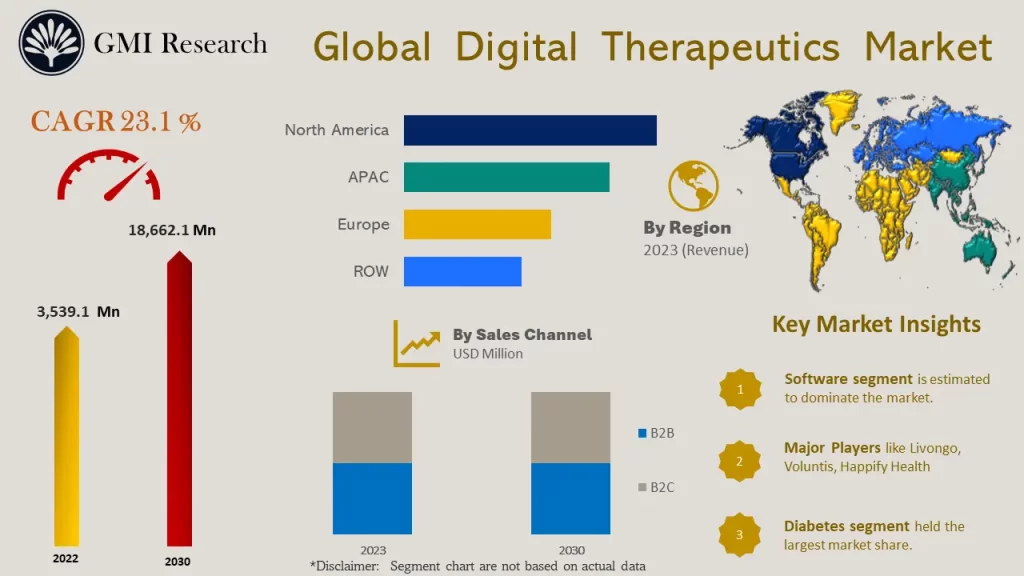No products in the cart.
Press Release
As per the GMI Research forecasts, growing investment in digital health stands to be one of the key demand drivers in the Global Digital Therapeutics Market. The market stood at USD 3,539 million in 2022 and is slated to register a double digit CAGR of 23.1% over the period 2023-2030 and is projected to reach USD 18,662 million in 2030.
Growing partnerships between digital therapeutics and biopharma companies continues to gather pace. Pharma companies have been strategically pouring cash into digital therapeutics firms to capture a slice of the growing digital therapeutics market. With FDA approving multiple digital therapeutics treatments, pharma companies can invest in digital therapeutics with more confidence that they’ll see a return on investment (ROI). For instance, Bayer and Informed Data System Inc. (One Drop) joined forces to develop digital health products across therapeutics areas that value up to USD 98 million, including increased equity stakes.
To have an edge over the competition by knowing the market dynamics and current trends of “Digital Therapeutics Market”, request for Sample Report here
A majority of digital therapeutics are complementary to pharmacological interventions and intended to be used in combination, particularly within CNS and behavioural health and for disease management of chronic indications. For instance, AstraZeneca has three digital therapeutics in the pipeline for oncology, cardiovascular and respiratory & immunology.
Digital therapeutics represents the fourth wave of digital healthcare. This provides a comprehensive solution that combines RPM with the care team, delivered via digital channels. Its modular architecture enables extensible innovations and continuous learning through AI algorithms. For Instance, Miao has developed strong proprietary technological capabilities which allow the company to provide AI-driven health management solutions and health grading services to clients.
Startups are leading ways by leveraging innovative digital therapeutic solutions such as AR & VR-enabled interactive video games to address mental health conditions. For instance, Sumitomo Dainippon Pharma and BehaVR announced a collaboration for multiple virtual reality digital therapeutics to treat social anxiety disorder, generalized anxiety disorder, and major depressive disorder.
On the basis of application, the diabetes segment is expected to high growth in the coming years. Growing incidence of diabetes globally stands to drive the market. According to WHO, about 422 million people have diabetes worldwide and 1.5 million deaths are directly caused by diabetes each year. Omada health delivers digital therapeutics for diabetes management. It offers digital behavioural intervention for the patients. Omada’s digital therapeutics health program is connected to the medical devices to track patients’ activity, weight, and nutrition to maintain their glucose level. It also incorporates training, personalized health coaching, and ongoing support of certified diabetes care specialists.
Key Developments:
-
- In 2021, Akili Interactive, a leading prescription digital therapeutics company, announced that EndeavorRx is the first and only prescription video game treatment for kids 8-12 years old diagnosed with ADHD. This is available to patients on Google Play store.
- In 2021, Pear Therapeutics, Inc. collaborated with Avalere Health to launch the Pear Prescription Digital Therapeutics Digest. It is a new class therapeutic that use software to treat serious disease. It is designed to collect real-world data used by prescribing clinicians and for population health management by payers and health systems.
The Global Digital Therapeutics Market has been segmented on the basis of Product, Sales and Application. Based on the Product, the market is segmented into Software and Services, Devices. Based on the Application, the market is segmented into Preventive and Treatment/Care. The Preventive segment is further segmented into Pre-diabetes, Obesity, Smoking Cessation, Others. The Treatment/Care segment is further segmented into Cardiovascular Diseases, Diabetes, Neurological Disorders, Respiratory Diseases, Others. Based on the Sales, the market is segmented into B2B and B2C.

